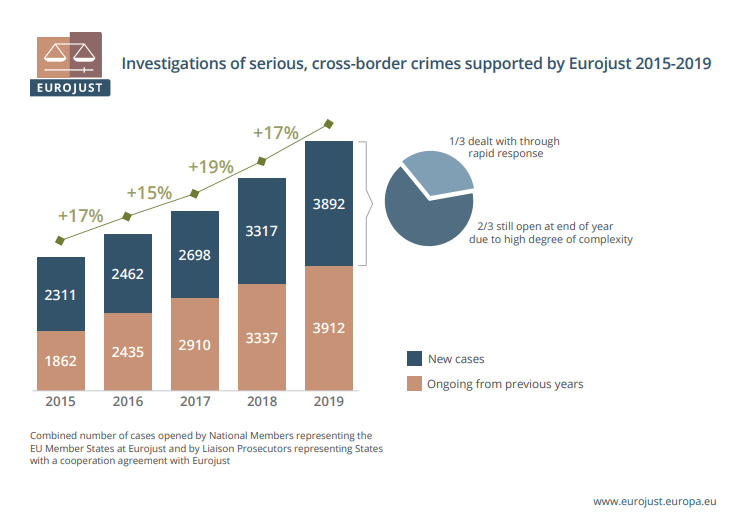Judicial authorities across the EU increasingly turn to Eurojust, the EU Agency for Criminal Justice Cooperation, to work together to tackle serious cross-border crime. Eurojust’s 2019 Annual Report, shows that prosecutors from across the European Union and beyond turned to Eurojust for tailor-made support in nearly 8 000 cases, an increase of 17% compared with 2018.
Working together through Eurojust, national judicial authorities achieved impressive on-the-ground results across a wide range of crime areas, including the freezing of approximately EUR 2 billion in criminal assets, bringing illicit drug trafficking worth over EUR 2.8 billion to a halt, and the arrests of nearly 2 700 suspects.
The largest amount of cases concerned a wide range of economic offences, including swindling, fraud, tax evasion, money laundering and corruption, as well as environmental crime and intellectual property crime. The number of new Eurojust cases concerning investigations of crimes prioritised in the European Agenda on Security nearly doubled in 2019:
- TERRORISM – For example, coordination within 24 hours through the Hungarian and Belgian National Desks at Eurojust resulted in the indictment of a suspected IS member for terrorism and mass murder. In another case, 12 Member States and 9 online service providers succeeded in disrupting terrorist online propaganda.On 1 September 2019, the Judicial Counter-Terrorism Register was established at Eurojust, which centralises links in proceedings against suspects of terrorist offences. In the first months of operation, the CTR spurred a sharp increase in information sharing on counterterrorism.Eurojust was also an important platform for counterterrorism experts to discuss how to deal with foreign terrorist fighters (FTFs) returning to Europe.
- CYBERCRIME – Nearly 250 cases focussed on cybercrime, such as Operation Cepheus, which culminated in the successful takedown of an international infrastructure distributing spyware to more than 14 500 buyers all over the world.
- MIGRANT SMUGGLING – The 187 cases of migrant smuggling concerned investigations tackling criminal activity along all major migrant smuggling routes to the European Union, with involvement of countries of origin and transit outside Europe. For example, a simultaneous action in December 2019 stopped the activities of an organised crime group smuggling migrants from the Middle East via Turkey and Greece to Romania. In another joint action, Greek and Italian authorities formed a joint investigation team to dismantle a criminal gang engaged in migrant smuggling by leisure boats on the Adriatic Sea.
- DRUG TRAFFICKING – More than 1 000 cases focussed on stopping drug trafficking. By working together in a joint investigation team, France, Poland and Ukraine successfully stopped the trafficking of a heroin substitute, including the planning and execution of a controlled delivery. Another major drug trafficking network was taken down through close cooperation between Denmark, Germany, Italy, the Netherlands, Norway, Spain, Sweden and the UK. In this case, a Norwegian court sentenced one of the main suspects to 19 years’ imprisonment and confiscated more than EUR 4.5 million.
- TRAFFICKING IN HUMAN BEINGS – 23% of all joint investigation teams supported by Eurojust in 2019 and nearly 400 cases focused on investigations of trafficking in human beings, with a steady increase in the participation of third States.
The 2019 Eurojust Annual Report also explains key organisational developments during the year:
- The new Eurojust Regulation entered into force on 12 December. Eurojust then became the European Agency for Criminal Justice Cooperation. The new regulation makes Eurojust even more fit for the purpose of fighting increasing levels of cross-border crime, with an Executive Board dealing with administrative matters and giving the College of prosecutors from all Member States more leeway to focus on the continuously rising number of criminal cases. The Regulation also enhances the pro-active operational capacity of the Agency.
- Eurojust’s cooperation with key institutional partners and Third States steadily increased, creating a gateway to 52 jurisdictions around the world. The network of Eurojust Contact Points grew during 2019 from 47 to 52 countries. Eurojust signed cooperation agreements with Serbia and Georgia, which unlock the possibility to systematically exchange operational information including personal data and post a Liaison Prosecutor to Eurojust.







Leave a Reply